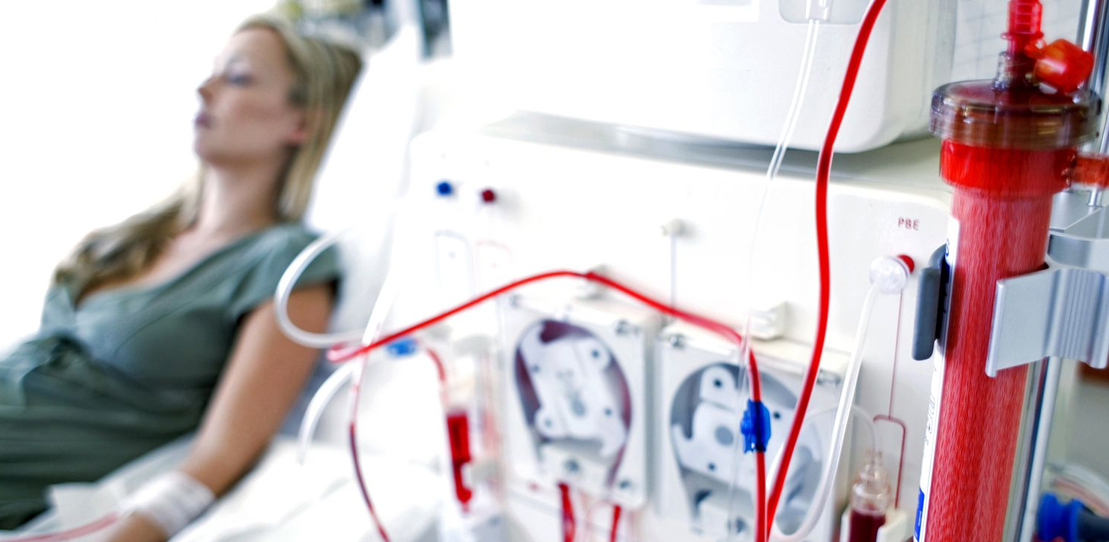
Dialysis
What is Dialysis?
Dialysis is a life-saving medical procedure recommended for patients with severe kidney damage due to an acute/chronic disease or trauma, which prevents the kidneys from functioning optimally. The procedure works by removing wastes and unwanted fluids from the blood, thereby helping to alleviate various symptoms as well as the risks of life-threatening complications. Dialysis can also be recommended as a bridge to transplant, for patients who are waiting for a donor kidney, as well as a primary treatment for those who do not qualify for a transplant. Dialysis has helped millions of patients across the globe and continues to be a preferred treatment modality for patients with renal failure.
Indications
Dialysis is an option for patients whose kidneys have become dysfunctional due to any of the following:
- Acute kidney injury (AKI), caused by an episode of acute renal failure or trauma sustained in an accident
- Kidney failure with a loss of around 85 to 90 per cent of the renal function
- Uremic encephalopathy, which is a brain disorder caused by the build-up of toxins in the body
- Uremic pericarditis, which is caused by waste build-up in the body due to renal failure
- Life-threatening hyperkalemia, which is marked by elevated serum pr plasma potassium levels in the body
- Refractory acidosis, which is caused by the build-up of certain acids in the body due to the inability of the kidneys to get rid of them
- Hypervolemia linked with end-organ complications like pulmonary oedema
- Peripheral neuropathy, i.e damage to the nerves in different areas of the body due to increased toxins
- Intractable gastrointestinal symptoms
- Asymptomatic patients with a glomerular filtration rate of 5 to 9 mL/min/1.73 m
- Consumption or use of any toxic substance that disrupts normal renal function.
How Dialysis works?
The kidneys perform many vital functions, the most important of which is to purify the body of wastes and unwanted fluids. This is exactly what dialysis does. It imitates the purifying function of the kidneys by helping to remove these. This helps to:
- Alleviate the risks of serious complications linked to waste accumulation in the body
- Maintain an optimal level of all essential nutrients, i.e potassium, calcium, minerals and vitamins
- Helps to regulate normal blood pressure
Types of Dialysis:
Dialysis is broadly classified into two different types. These are:
Hemodialysis (HD) :
This involves the use of a special dialysis machine to purify the patient’s blood. The procedure can be performed at the hospital or at home, under strict medical supervision. Doctors surgically place an arteriovenous fistula in the patient’s arm. This is then connected to the hemodialysis machine, which drains blood, purifies it with the help of a dialysate solution and reintroduces it into the patient’s bloodstream. The session generally lasts for around 4 to 5 hours and it can be repeated several times a week depending on the specific needs of the patient. Nowadays portable dialysis machines are also available that allow the patient to perform the procedure without any need for medical supervision. Your doctors will teach and brief you regarding how the machine is to be operated, which makes the experience completely hassle-free.
Peritoneal Dialysis (PD) :
It is a type of dialysis that is performed by using the lining of the patient’s abdomen, i.e. the peritoneum, to purify the blood. In this case, no machine is used. Doctors perform surgery to place a catheter in the patient’s abdomen, near the navel. This is used to administer dialysate for filling the patient’s belly. When blood passes through this area, unwanted fluids and toxins are left out. Once the procedure is complete, the fluid mixture is drained out. The time for which the dialysate is left in the patient’s abdomen varies depending on the specific needs of the patient. Peritoneal dialysis is further classified into the following two types:
- Continuous Ambulatory Peritoneal Dialysis (CAPD)
- Automated Peritoneal Dialysis (APD)


 0141-3120000
0141-3120000